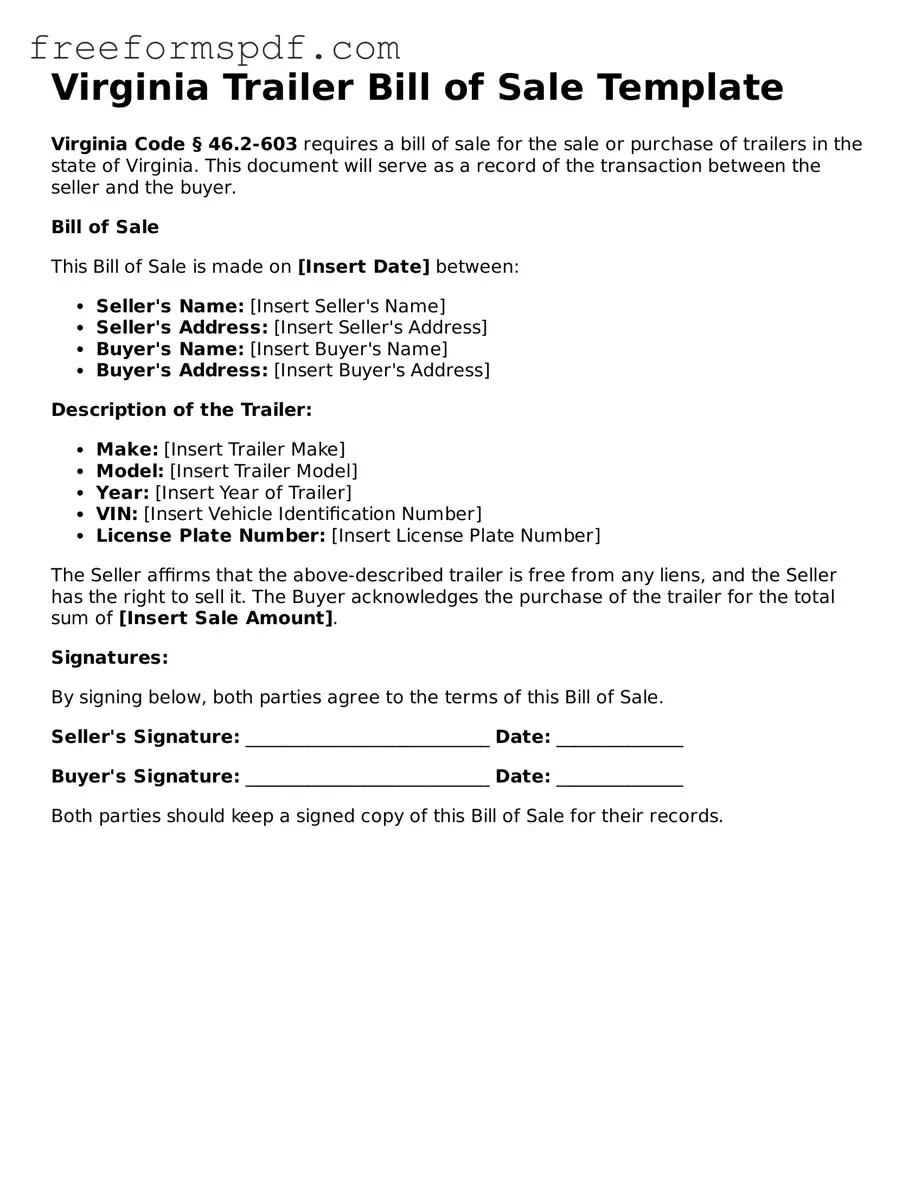Attorney-Verified Trailer Bill of Sale Document for Virginia State
Common mistakes
-
Incomplete Information: Failing to fill out all required fields can lead to issues later. Ensure that both the seller and buyer's names, addresses, and signatures are included.
-
Incorrect Vehicle Identification Number (VIN): Double-check the VIN. An incorrect number can cause problems with registration and ownership transfer.
-
Not Including Sale Price: Leaving out the sale price may create confusion. Clearly state the amount to avoid disputes in the future.
-
Failure to Sign: Both parties must sign the document. Without signatures, the bill of sale is not valid, and ownership cannot be transferred.
-
Not Keeping Copies: Failing to keep a copy of the completed bill of sale for personal records can lead to complications. Always retain a copy for your files.
Learn More on This Form
-
What is a Virginia Trailer Bill of Sale?
A Virginia Trailer Bill of Sale is a legal document that records the transfer of ownership of a trailer from one party to another. This form serves as proof of the transaction and includes essential details about the trailer, such as its make, model, year, and Vehicle Identification Number (VIN).
-
Why do I need a Bill of Sale for my trailer?
A Bill of Sale is important for several reasons. It provides legal protection for both the buyer and the seller by documenting the terms of the sale. This document can be used to establish ownership, especially if the buyer needs to register the trailer or if there are any disputes regarding the sale in the future.
-
What information is required on the form?
The Virginia Trailer Bill of Sale typically requires the following information:
- The names and addresses of both the buyer and the seller
- The date of the transaction
- Details about the trailer, including make, model, year, and VIN
- The purchase price
- Signatures of both parties
-
Do I need to have the Bill of Sale notarized?
In Virginia, notarization is not a strict requirement for a Bill of Sale. However, having the document notarized can add an extra layer of authenticity and can be beneficial if any disputes arise later. It is advisable to check with local DMV regulations or legal counsel for specific requirements.
-
Where do I submit the Bill of Sale?
After completing the Virginia Trailer Bill of Sale, the buyer should keep a copy for their records. The seller may also want to retain a copy. To register the trailer, the buyer will need to take the Bill of Sale to their local Department of Motor Vehicles (DMV) office along with any other required documents.
Misconceptions
Understanding the Virginia Trailer Bill of Sale form is crucial for anyone involved in the sale or purchase of a trailer in the state. However, several misconceptions can lead to confusion and potential legal issues. Here are eight common misconceptions, along with clarifications to help navigate this important document.
- It is not necessary to have a Bill of Sale for a trailer. Many people believe that a Bill of Sale is optional for trailer transactions. In reality, it serves as a legal record of the sale and is often required for registration purposes.
- Only the seller needs to sign the Bill of Sale. Some assume that only the seller's signature is necessary. However, both the buyer and the seller should sign the document to ensure that both parties acknowledge the transaction.
- The Bill of Sale does not need to be notarized. While notarization is not always mandatory, having the document notarized can provide additional legal protection and is recommended for high-value transactions.
- All trailers require the same Bill of Sale form. Many people think that one generic form suffices for all trailer types. In Virginia, specific forms may be required depending on the type of trailer, such as utility, camper, or boat trailers.
- The Bill of Sale automatically transfers ownership. Some believe that simply completing the Bill of Sale transfers ownership. In fact, the buyer must also register the trailer with the Department of Motor Vehicles to complete the transfer legally.
- The form is only for private sales. There is a misconception that the Bill of Sale is only applicable for private transactions. However, it is also used in dealer sales and should be completed in such cases as well.
- There is no need to include trailer details. Some individuals think that they can leave out specifics about the trailer. In truth, including details such as the VIN, make, model, and year is essential to avoid disputes later on.
- Once the Bill of Sale is signed, it cannot be changed. Many believe that the document is final and cannot be amended. While it is advisable to ensure accuracy before signing, if errors are discovered, both parties can agree to correct the document as long as both sign the changes.
Awareness of these misconceptions can help individuals engage in smoother and more legally sound transactions when dealing with trailers in Virginia. Taking the time to understand the requirements and implications of the Bill of Sale is essential for both buyers and sellers.
Some Other Trailer Bill of Sale State Templates
Trailer Title - Secures the sale details to avoid misunderstandings later on.
How to Register a Trailer - Required for proof of ownership transfer during registration.
The Optional 25-Year Retirement Program for Emergency Medical Technicians (EMT) is designed to provide significant benefits to eligible members. For those interested in navigating the application process effectively, resources like NY Templates can be invaluable, offering guidance and templates to assist with the necessary documentation.
Oregon Trailer Laws - Can help track ownership history for future buyers of the trailer.
Free Bill of Sale Washington State - Acts as an agreement that both buyer and seller accept.
